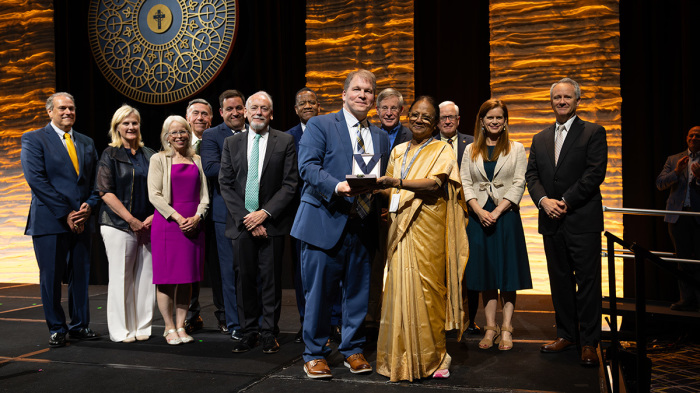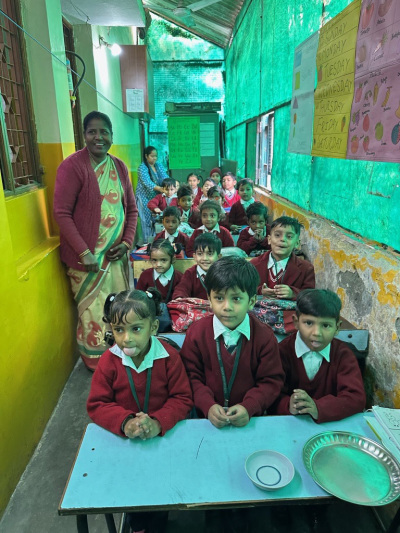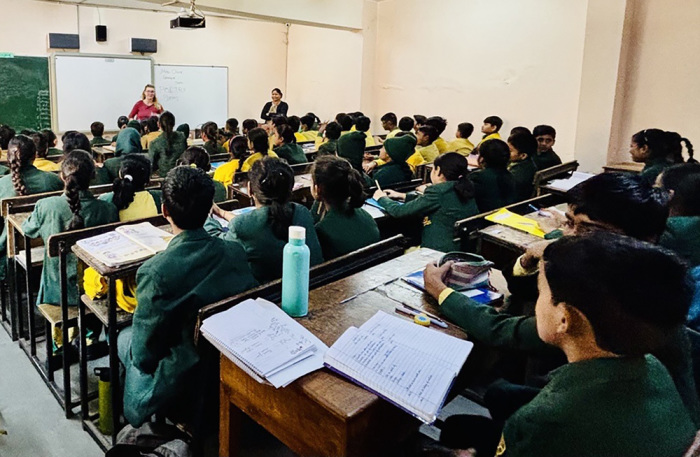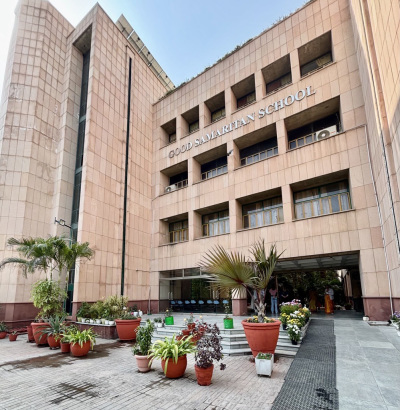Educator Ananthi Jebasingh receives Colson Center’s Wilberforce Award

LOUISVILLE, Ky. — “Oh, I got something better than the Taj Mahal. I’ve got a toilet school in the slums of Delhi.”
Those are the words Tim Philpot recalled hearing his best friend and tour guide say upon departing the “grandeur” of India’s Parliament.
It was 1995, and as a retired Lexington circuit judge and chairman of the nonprofit Fishhook International, Philpot had taken a medical team to Calcutta before venturing to India’s capital to meet with lawmakers. Events that day were “amazing,” he said, soaking in the sights and sounds of New Delhi while looking forward to his next destination to tour the Taj Mahal.
God had other plans that day. Instead of traveling onward to tour the picturesque 17th century marble mausoleum and UNESCO World Heritage Site, Philpot was taken on a detour to see a tiny school operating out of a filthy, odorous community toilet complex used daily by thousands of people.
“We walked a few minutes over to the slum area. Before we saw the toilet complex, we smelled it. Before we saw the children, we heard them singing and laughing,” Philpot recounted at the 37th annual Wilberforce Award dinner Saturday evening honoring Ananthi Jebasingh, founder and director of the Good Samaritan School, during the Colson Center National Conference.
‘It was a sanctuary’
Philpot said that seated before him were 90 children wearing red sweaters, all studying at their desks and chalkboards filling the room.

“Smiles all around reminded me that this was not just a public toilet; this was a school, or should I say, for the children of that slum, it was a sanctuary,” he said.
Jebasingh is college-educated. In fact, she was a wife, mother and college professor with a doctorate in linguistics when a child who lived in the slum across from her family’s apartment started coming to her door, begging for food. Soon, one child begging for sustenance multiplied. She quickly decided that these children were not going to become beggars. She would feed them, but she would also educate them.
The number of children she was helping swelled to over 100, and this led her to ask a local official for the use of a building to educate these children. What she was offered was the use of the local toilet complex used by the 25,000 people living in the Alakananda slum in 1991.
She couldn’t believe that as a woman with a Ph.D., the only location she was being offered to educate these impoverished children was a filthy toilet room. But this was a positive turn of events, she said, because it crushed her pride.
“These places are disgusting. You can’t even imagine them,” said Tehmina Arora, who serves as a lawyer specializing in human rights as the director of advocacy for Asia with ADF International. “To be able to go into someplace like that, to clean it up, to teach them. Not on one occasion […] it is really remarkable. That space created a pathway for so many young people to come out of the slum, to become people with a profession, to have dignity.”
Jebasingh, whom Arora described as a pioneer, has been “faithfully sowing into the lives of children through the Good Samaritan School” for nearly four decades.
When Philpot returned to Kentucky following his first visit to the toilet school over 30 years ago, he shared his experience during a presentation to a classroom of local schoolchildren. After hearing about the slum children in New Delhi, students in Kentucky collected money among themselves and others in the community to send as part of an effort to establish a proper building for the students and teachers to have a better learning environment.
“And so, each child began to come in and give their allowances to what they called the Fisher children at Ananthi’s school,” he shared.

Don’t question, ‘just do it’
Today, Good Samaritan School provides education, nutrition and medical care to over 3,000 students at six schools. Since 1989, over 2,400 students have graduated from the school.
During a sit-down interview with The Christian Post, Jebasingh shared that there were moments, especially at the beginning, when her home and garage were filled with so many children that her husband advised her to stop. However, he soon changed his mind and urged her to continue her work.
While she stressed that, especially for married couples, there should be mutual agreement when carrying out such massive endeavors, like she had done, “when you feel there is a large intention that you should do something, then you don’t question. Just do it.”
“Whatever barrier comes, it’s beyond us to tackle that, but it’s not beyond God,” she said.
In her situation with her husband, Jebasingh prayed, fasted for three days and sought God’s guidance on what He wanted them to do.
“That is when you have to be open to the call,” she added. “I’ll say, for everyone, God has something for their life. Our life is not at all empty. It has a purpose. And even if it’s very negative, or it may look very negative and most difficult,” doors will be opened, she assured.
“Whatever difficulty comes in our life or in our work, He’s there to handle it. I need not handle it. Whenever I handle it, I miss things. But when we allow God to handle it, it’s beautiful.”
For the students educated at Good Samaritan School, Jebasingh wants to see them flourish and have a “purposeful life” and use their education to break free from a life of poverty and servitude.

“This education helps them to be empowered,” she continued. “When education was denied to them, they were just doing all sorts of menial job and servitude. […] It liberates them. It makes a tremendous change in the life of the people.”
Jebasingh, whose presence is full of grace, humility and love for others, said she “never expected any award” in this life.
“I’m nothing. I never thought there would be an award for my work,” said Jebasingh in her acceptance speech as the 37th Colson Center Wilberforce Award recipient.
Colson Center President John Stonestreet hailed Jebasingh’s work and “faithfulness to educate and demonstrate God’s love to India’s most vulnerable.”
“As Christians, we are called to preserve what is good and restore what is broken in our spheres of influence, and Dr. Jebasingh’s work at Good Samaritan School models this calling,” Stonestreet said.
Decades ago, she recalled seeing Chuck Colson, for whom the Colson Center is named, speak at an auditorium in India.
“You’ll be surprised that Chuck Colson came to India. There was such a big crowd, and my husband and I went there and we met him,” she told the Colson Fellows and others gathered at the award dinner. “And so, I was always thinking of Prison Fellowship. My husband was interested in visiting prisoners, and this was such a major surprise for me that they’re offering this Wilberforce Award [that is the result of] the change that came in the heart of Colson through the Watergate scandal and the passion with which Wilberforce worked for the deliverance of the slaves.”
“I pray such changes will come in the hearts of our children and the community. Please pray for our land, pray for our children,” she added, lamenting that far too many have no hope of breaking free from the poverty they were born into.
Over 24.6 million children ages 6-14 in India do not attend school, according to the government’s own statistics from 2023-24, highlighting the urgent need for K-12 education for all students.
Laura Marie Thompson, a board member and lead director of Friends of the Good Samaritans, a nonprofit that raises funds to care for underprivileged children in the slums of India by providing education, nutrition and medical care, shared highlights from her life-changing experiences working at the school for the first time.
At 22, she was lost and searching for meaning and purpose in her life. She found it while teaching arts and crafts to elementary school students at the main school in New Delhi.
“Children [were] coming in whose moms just ended their own life with their child. I mean, just atrocious situations that our counselors and our staff deal with,” she said with a heavy heart.
But by having the opportunity to receive an education, she saw firsthand the students’ transformation, “watching those kids come through the door; their hearts were just smiling.”
After Thompson returned home to the United States, she began working for the Friends of Good Samaritans, where she developed this nonprofit’s sponsorship program.
“So what I do need to tell you is we have a lot of work to do. We are right in the middle of it, and there have been a lot of challenges, she added, while also celebrating efforts to help educate more children.
Every year, the Colson Center presents the William Wilberforce Award to a Christian leader who has made a lasting difference in their sphere of influence, demonstrating similar principled courage as the British abolitionist.
Previous recipients include David and Barbara Green, owners of Hobby Lobby; Joni Eareckson Tada, founder and CEO of Joni & Friends; and Maggie Gobran, Nobel Peace Prize nominee and CEO of Stephen’s Children.
Follow Melissa Barnhart on Twitter: @MelBarnhart


















